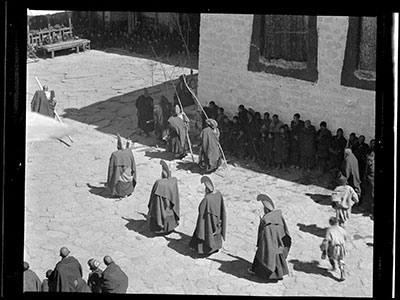
2001.59.1.19.1 (Film negative)


2001.59.1.19.1 (Film negative)

Hugh E. Richardson
Hugh Richardson
March 6th 1937
Lhasa > Jokhang (main entrance from Doring house) >
2001.59.1.19.1
54 x 43 mm
Ritual Activity , Worshipping
Negative film nitrate
Donated August 2001
The executors of the estate of Hugh E. Richardson
Hugh E. Richardson
Manual Catalogues - Notes on negative album - '1' 'Chipsha: Dzonggyab [rdzong rgyab]: Torgyap [gtor rgyag] ----- [illegible]' is written in white in Richardson's hand. Notes inside negative album: white label with Richardson's name and address in St. Andrews. [KC 8/7/2006]
Manual Catalogues - Notes on negative index - Folio 19. 'Khri Rim.'. [KC 17/7/2006]
Manual Catalogues - Richardson's hand list: Negative album No.1 'New Year Ceremonies at Lhasa'. The Smon-lam gtor-rgyag Ceremony on 24th of 1st month for driving out evil. No. 21. 'The Zhal-ngo, the Proctors of 'Bras-spungs (Drepung) arrive. They have been in control of the city of Lhasa during the first part of the month wen some 25,000 monks come to the city to pray and to receive alms.' [KC 17/7/2006]
Technical Information - This image seems to have been taken with a Zeiss Super Ikonta C camera. This was a 6x9 format camera but came with a film plane mask that enabled 6x4.5 images to be taken. This enabled 16 images to be taken on a roll of 120 film as opposed to 8 without the mask [MS 6/10/2005]
Research publication - Hugh E. Richardson, Ceremonies of the Lhasa Year , 1993, London: Serindia Publications, p.41. "The Shengo arrive at the forecourt of the Jokhang for the Monlam Torgya." [KC 23/10/2006]
Other Information - Background: See Hugh E. Richardson, Ceremonies of the Lhasa Year , 1993, London: Serindia Publications, pp 39-49 for a description of the Monlam Torgya ( mon lam gtor rgyag) ceremony. "The ceremony of Monlam Torgya is the longest and the most spectacular event of the New Year celebrations. It is the high point of the Yaso's tenure of office and the day for which the Tsisher was the preparation. It brings together religious and secular elements and marks the formal end of the Monlam Chenmo. ... The ceremony begins with the arrival of the Shengos [proctors of Drepung] and their assistants who march from the Shingra gate, a little way south of the main entrance to the Jokhang. ... They take their seats on a bench below the Dalai Lama's window." (p.39-40) [KC 17/7/2006]
Other Information - Dates: In a letter to his parents dated November 6th 1936, Hugh Richardson commented that he was investigating buying a new Zeiss Super Ikonta camera [Hugh Richardson Manuscript Archive, Bodleian Library, MS. Or. Richardson 3 folio 46]. On March 29th 1937 he comments in a further letter to his parents that it would probaby be better to use the larger image frame [MS Or Richardson 3 folio 82]. This has assisted the dating of this image to 1937 [MS 6/10/2005]
For Citation use:
The Tibet Album.
"Arrival of the Shengo for the Monlam Torgya ceremony"
05 Dec. 2006. The Pitt Rivers Museum.
<http://tibet.prm.ox.ac.uk/photo_2001.59.1.19.1.html>.
For more information about photographic usage or to order prints, please visit the The Pitt Rivers Museum.
© The Pitt Rivers Museum